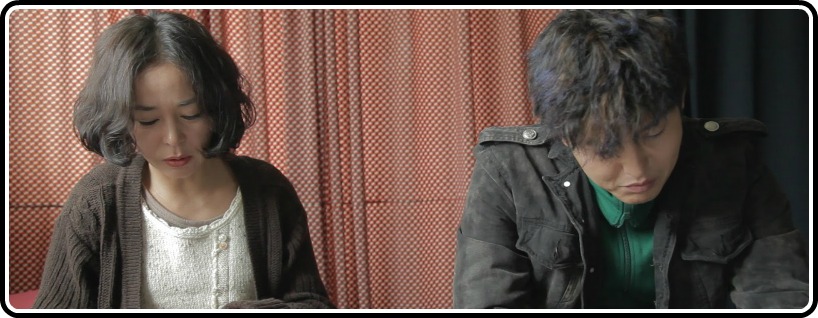
To put it bluntly, Pietà is a baseless experience posturing under the guise of arthouse profundity. I’m not quite sure what Michael Mann and fellow jury members were thinking when they awarded it the Golden Lion. I’m also not sure how so many people are being tricked into finding meaning in this faux infant terrible submission. It comes down on us like a sloppily blunt object but without the impact. Kim Ki-duk’s limply affected ‘realism’ is a creative cop-out as he shamelessly uses his name and reputation to wrongly excuse his barely present content. It’s a defense mechanism that only goes so far; you only have to remove his proclamation ’18th film’ statement to realize this entire film, from its unpracticed camera to its cheap shock tactics, is a pile of bull.
Kang-do (Lee Jung-jin) is an unfeeling loan shark who spends his days sadistically crippling his industrial citizens after they can’t pay up on unreasonable interest rates. He has no friends, he barely speaks and his life is generally soulless wasteland. One day, Mi-son (Jo Min-soo) shows up claiming to be Kang-do’s mother who abandoned him at birth. He dismisses her claims, becoming more and more irate as she insists on coming into his apartment, washing his dishes and following him everywhere he goes. Kang-do finally concedes to acknowledge her presence, and humiliates her in various ways including slapping her, making her eat a part of his cut off thigh (seriously) and finally raping her. From there, the film veers into a lazy uncommitted land of revenge, redemption and dysfunctional familial bonding.
Reading interviews with Kim Ki-duk makes it clear that his idea of dealing with criminals isn’t necessarily to punish, but to remember compassion as a virtue and that redemption is within reach if one is willing to open themselves up to feeling and remorse. Kang-do is not so much seen as a monster, but as an unfeeling child-robot victim who is the way he is because his mother abandoned him. This kind of distorted naivete is everywhere in Pietà and the misplaced empathy that Kim so kindly and unjustifiably heaps onto his typical loner character Kang-do is nowhere to be found amongst his other characters.
For those who have claimed ‘it’s more complicated than that’ in regards to Kim’s recurrent misogyny; if this isn’t misogyny, what is? When it comes to Pietà, the word complicated is as antithetical to its petty affectations. I generally call myself a fan of Kim Ki-duk’s, at least from the films of his I have seen and yes, that includes The Isle. 3-Iron in particular struck an indelible spiritual chord of offbeat human connectivity. But the women in his films are almost always relentlessly victimized, complete with crumbling upper lip and guttural anguish. They rarely register as actual characters and are usually punching-bag substitutes.
In Pietà, the absent mother is directly blamed for Kang-do’s lack of empathy or maturity. And it is only when she is punished via rape that reconciling is possible between them because the act is disgustingly seen as putting them on equal footing. Later narrative developments may put this causal argument into question, but at that point in the story all information points to this reasoning. Kim stated that he purposefully cuts away from violent acts in the film so the audience is left to fill in the blanks of cruelty. It says a lot about how he defines violence because rape apparently doesn’t qualify for him; that act gets the distinction of being shown unlike the cutaways to other kinds of physical harm.
There is also zero sympathy for the drowned-in-debt industrial workers. Kang-do consistently asks why they borrowed the money in the first place. Basically, the viewpoint is that they dug their own hole so now they deserve to lie in it. All of this oversimplified cause-and-effect not only makes the film rudimentary, but it makes non-entity of an antihero Kang-do a misguidedly sympathetic savior.
Kim Ki-duk’s films usually provoke extreme responses, but the prodding here is entirely superficial and not in service of any thought-provoking idea or layered whole. There is a line between challenging provocation with intent and empty provocation borne out of malignant rage. The ugliness of the film capsizes all, especially since it is unsupported by thoughtfulness or purpose. It all goes back to him using his reputation in the title credits as a carte blanche, a get-out-of-jail-free card where all offensive and brutal content is used as a false prompt to read into supposed depth. And it can conveniently be backed up with ignorant claims of ‘well it’s not supposed to be pleasant to watch’ and a misperceived truth that in the arthouse world, unpleasantness equates meaningful truth. With Pietà; look closer – there’s nothing there.
Most of its length consists of repetitive name-calling exchanges and abuse, with slapping every which way and suicide and crippling abound. Pietà comes out of Kim’s charred disappointment at how money and loan sharks have affected South Korea as a contributing factor of monetary obsession and a high suicide rate. The filming of the Cheonggyecheon’s area of industrial labyrinth certainly leaves an impression as does that final image. Kim Ki-duk’s raw inner turmoil at the world he observes are the material with which Pietà exists; he just forgot to mold those emotions into an actual film. The result is truly artless and repugnant with zero return value adding up to the oh-so-grand statement that, ya know, money is bad. Revelatory stuff Kim; truly.



